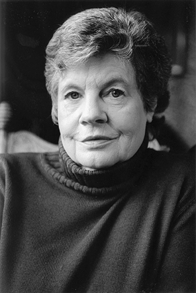Hungry For the World
An Interview with Novelist A.S. Byatt

All great novelists must be experts on human passion; British writer A. S. Byatt has specialized in the passions of the mind–art, science, philosophy. Working the territory where emotional and intellectual drives entwine, she explores the surprising ways in which ideas influence lives, creating compelling historical and contemporary novels and short stories. Over the last four decades, her work has garnered an international audience of readers (her work is translated into twenty-eight languages) who relish her mix of erudition, fairytales, and cracking good stories.
Already a formidable literary figure in England, Byatt first achieved Stateside success in 1990, with her Booker Prize-winning novel Possession: A Romance, a story about a clandestine love affair between two Victorian writers and the two modern-day academics who unearth their secret; the novel was made into a film in 2002. Her novella Morpho Eugenia, in which a nineteenth-century entomologist’s fascination with the social relationships of insects offers clues to the strange goings-on in a manor house, was made into the film Angels and Insects. She’s written eight other works of fiction, and her critical work includes Degrees of Freedom: The Novels of Iris Murdoch, Passions of the Mind: Selected Essays, and On Histories and Stories.
Born in Yorkshire, England, Byatt read English at Cambridge and continued her studies at Bryn Mawr College in Pennsylvania and at Oxford. She taught English and American literature at University College in London before returning to full-time writing in 1983. She recently passed through Minneapolis to give an Esther Freier Endowed Lecture in Literature at the University of Minnesota, and I was able to speak with her about her most recent collection, The Little Black Book of Stories, and a variety of issues in contemporary fiction.
MARGARET TODD MAITLAND: Many of your characters are artists, scientists, and scholars. Their aesthetic and intellectual passions often drive the action in your novels and short stories. This seems at odds with much contemporary fiction, in which the characters are trying to battle their way out of a dysfunctional family but lack any interests that might give them energy or power.
A.S. BYATT: Writing historical fiction is a way of escaping what I call the hygiene of the self. It’s awful to continually be looking at your self and what is wrong with it, and how it gets after things, and how it could make itself better. When you stop being interested in yourself and start being interested in other things, the self is actually much better. Novelists used to know this.
MTM: So do you see a failure of imagination and curiosity about the outer world on the part of contemporary writers and their characters?
ASB: I think writing these novels about how to find yourself is a substitute for religion. The Norwegians haven’t got any novels that aren’t about the hygiene of the self, so they tell me, and the French have gone into a dreadful slump of what they call nombrilisme, or navel-gazing.
One of the good things about the British novel at the moment I think, in fact, is that the men certainly are not doing [that]–people like Lawrence Norfolk or David Mitchell. There are an awful lot of women who are doing nothing but hygiene of the self, but there are women–A.L. Kennedy, Pat Barker, Ali Smith–who are doing other things, which are also very exciting.
Novelists are increasingly interested in the hygiene of the self, while the public are increasingly reading books with information about things. Longitude, by Dava Sobel, the history of the color mauve . . . You publish a little book on some interesting object and people will fall upon it because they don’t want any more hygiene of the self. They’re hungry for the world to be alive and interesting.
Wanna finish reading this interview? Visit our website at www.ruminator.com to find out where you can pick up a copy of Ruminator in your neighborhood!